On Sep. 23, 2010, Blockbuster, a U.S.-based retail video rental chain with nearly $1 billion worth of debt, filed for bankruptcy. If the name doesn’t ring a bell, Blockbuster was once the world’s dominant home video rental service, with over 9,000 retail stores worldwide.
What brought Blockbuster down? Its competitors. Netflix, Redbox, and similar companies saw the future of video rentals and pivoted their business model to adjust for audience needs better than Blockbuster.
While that’s a story of the video rental industry, the takeaway is to keep your eyes peeled for what your competitors are doing.
In the land of search engines, that means tracking the competitors’ search engine performance so your search engine optimization (SEO) efforts don’t fall behind.
Now, that doesn’t mean you have to sit down and scour the search engine result pages (SERPs) for thousands of relevant keywords and see how many results link to your competitors’ ranking content.
Instead, you can use multiple SEO competitor analysis tools, which we’ll share here. Let’s dive in.
Best Competitor Analysis Tools
Depending on the industry, competitors will rack up search engine rankings like it’s child’s play and accumulate retweets and reactions as if you stumbled upon Beyoncé’s socials instead of your competitor’s.
Now, you could simmer in jealousy or use it as fuel to take action. But to navigate this fiercely competitive landscape, you’ll need tools that help you cover all the bases. That’s why we’re listing different competitor research tools and their best use cases.
1. Semrush
Doing a competitor analysis without Semrush or Ahrefs is like trying to cook without ingredients. You’ll lack the essential SEO insights to make your content efforts count. For instance, you won’t have much tangible information on competitors’ traffic, backlinks, and ranking keywords.
And that’s just the basics. Semrush also offers a lot of specific tools for competitor analysis.
To start, Semrush lists your organic competitors, which are websites that compete for similar keyword queries. Let’s see what those look like for HostGator.
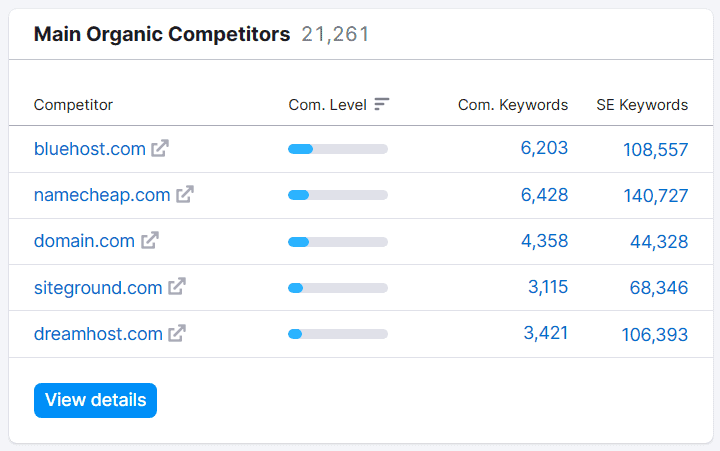
Once you have identified your competitors, you can check out Semrush’s Keyword Gap to see where your SEO content strategy lags. For instance, if you compare HostGator’s content strategy with that of Bluehost, NameCheap, Domain.com, and SiteGround, you get:
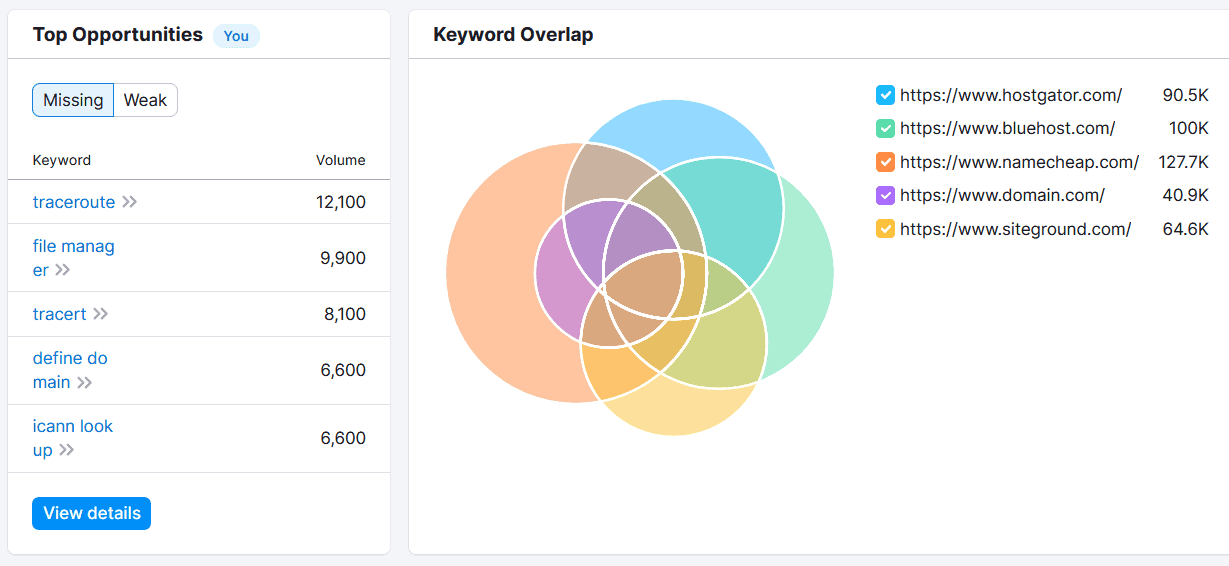
HostGator isn’t ranking for keywords surrounding traceroute, which seems like a major missed opportunity because it’s a helpful command for website owners looking to troubleshoot network issues on their websites. Similarly, you’ll find many such keywords for your website.
That said, if both you and your competitors are well-established authorities in your niche, the content gap might not be as exploitable, as is the case for HostGator.
Instead, you can check out the Position Changes of your competitors to see which new keywords they started ranking for and where they lost their positions. This way, you get the latest, real-time opportunities you can use.
In addition, you can see the competitors’ backlink profiles and compare them with yours to see if they’re getting specific media coverage you’re in the dark about.
Best as: An all-in-one competitor research tool.
Pricing: Starts at $108.33/month when billed annually.
2. Ahrefs
Ahrefs and Semrush are like Coca-Cola and Pepsi in the SEO world. Both are dominant players with similar offerings but different tastes.
Almost everything you can do with Semrush can also be done with Ahrefs — just a bit differently.
For instance, you can find the organic search competitors by heading to Competing Domains.
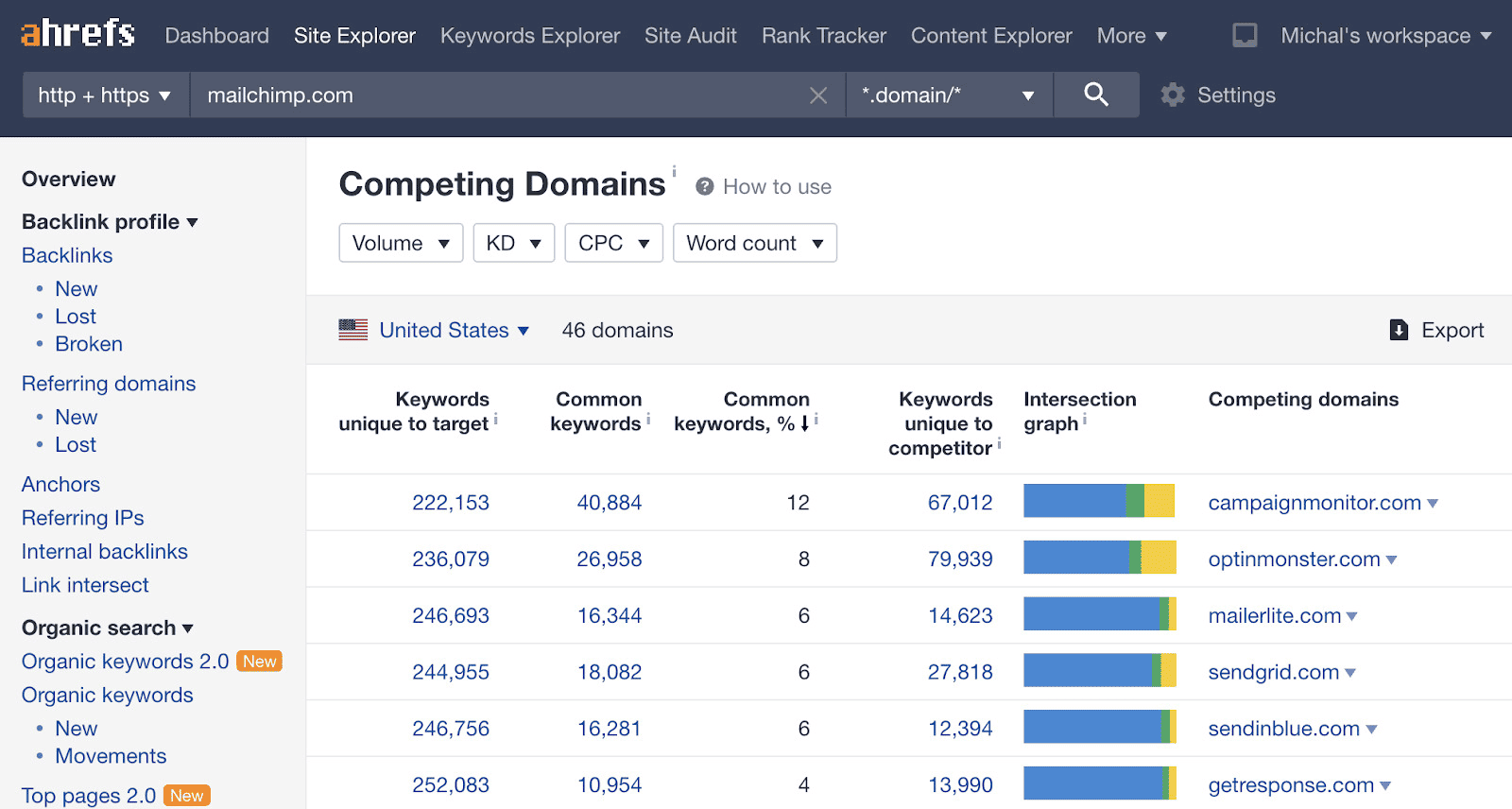
And if you’re looking to exploit the keyword gap, you can try out Ahrefs’s Content Gap.
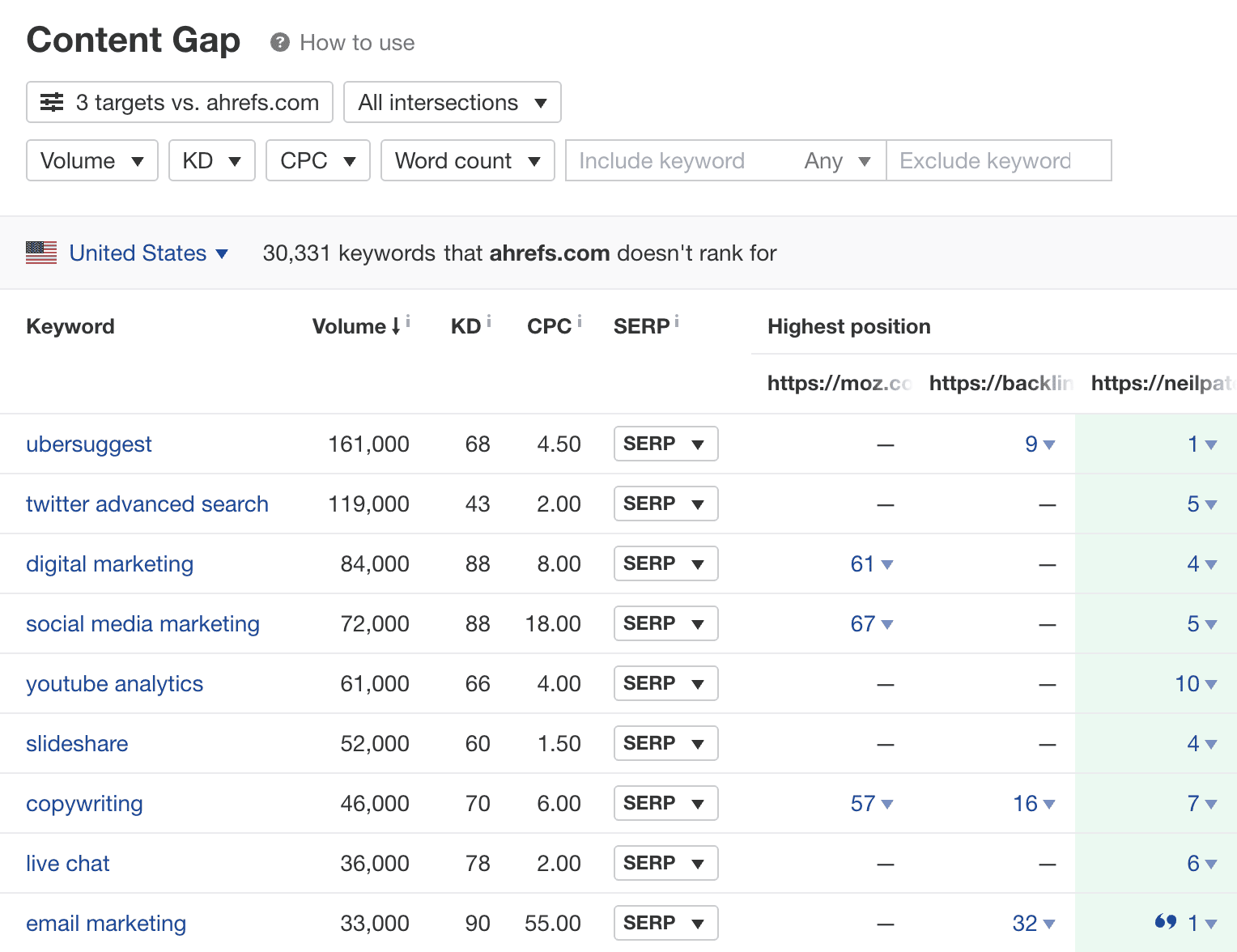
Similarly, you can study the backlink profiles of your competitors as well.
However, there are certain nuances. For instance, Ahrefs doesn’t offer as much data in keyword research as Semrush — you get search volume, keyword difficulty, cost-per-click, and clicks but miss out on SERP features, keyword trends, competitive density, and more.
But, on the other end of the spectrum, Ahrefs is known for its backlink database. Brian Dean of Backlinko shares in his blog, “I personally find Ahrefs easier to use overall for link stuff. It takes fewer clicks to see a page’s best links. The pages that have the most links. And more.”
Juicy bit of gossip: Semrush acquired Backlinko in 2022, so that’s a strong take from Brian Dean.
Besides that, Ahrefs typically has the most updated information on backlinks, given it has one of the most active web crawlers, according to Cloudflare.
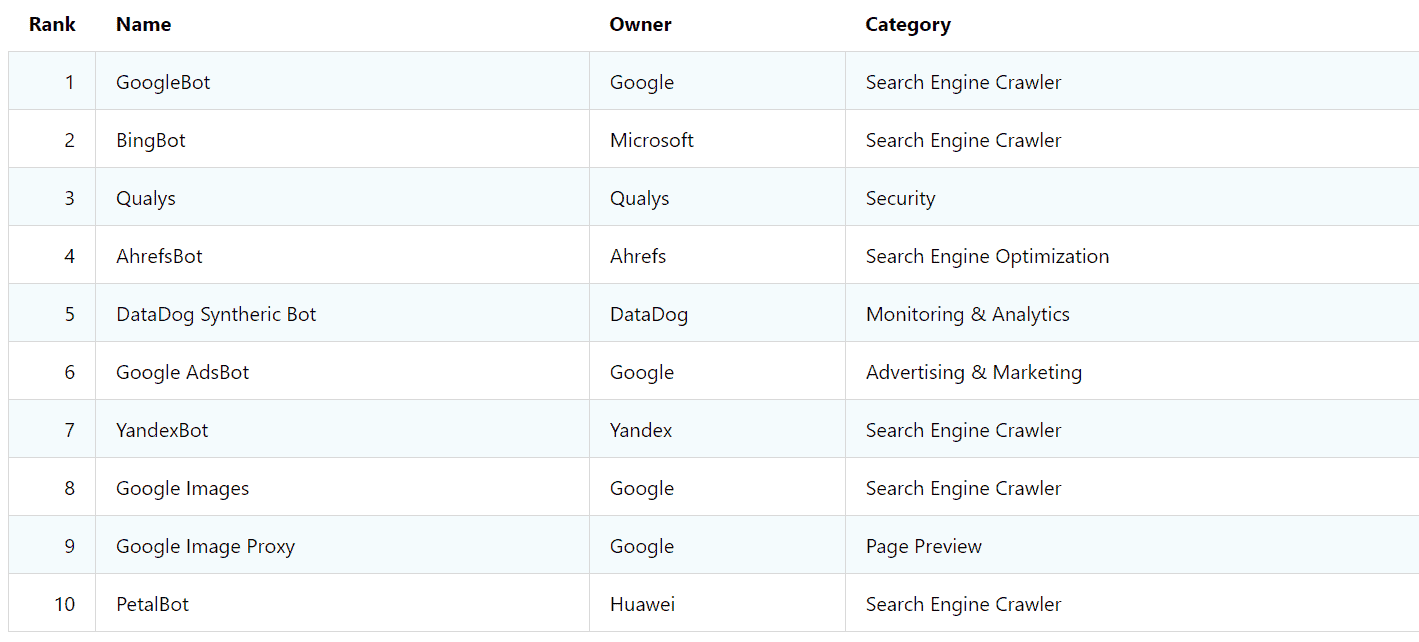
Best as: A tool specifically for backlinks or an alternative to Semrush.
Pricing: Starts at $83/month when billed annually.
3. Moz Pro
Moz Pro isn’t as proficient as Ahrefs and Semrush for organic keyword research, but it still has a few unique competitor analysis tricks up its sleeve.
To start, Moz Pro’s competitive suite prepares a list of the top 25 SERP competitors using the Rivalry metric. Rivalry considers the authority of both domains and shared keyword volume, similarity, and rankings to give a score between 1–100 and rank relevant competitors.

Besides that, like Ahrefs and Semrush, Moz Pro also lets you identify keyword gaps in your content marketing strategy compared to competitors. In fact, you can use a metric called Traffic Lift to see how much traffic boost you can expect by outranking the competitor for that keyword.

A remarkable tool that Moz offers is MozBar. It’s a free SEO extension that lets you study the competing SERPs. You can visit a competing result to get its page authority, domain authority, spam score, and number of backlinks.
Additionally, you can also use the Highlight Links feature to view a snapshot of a competitor’s linking strategy.
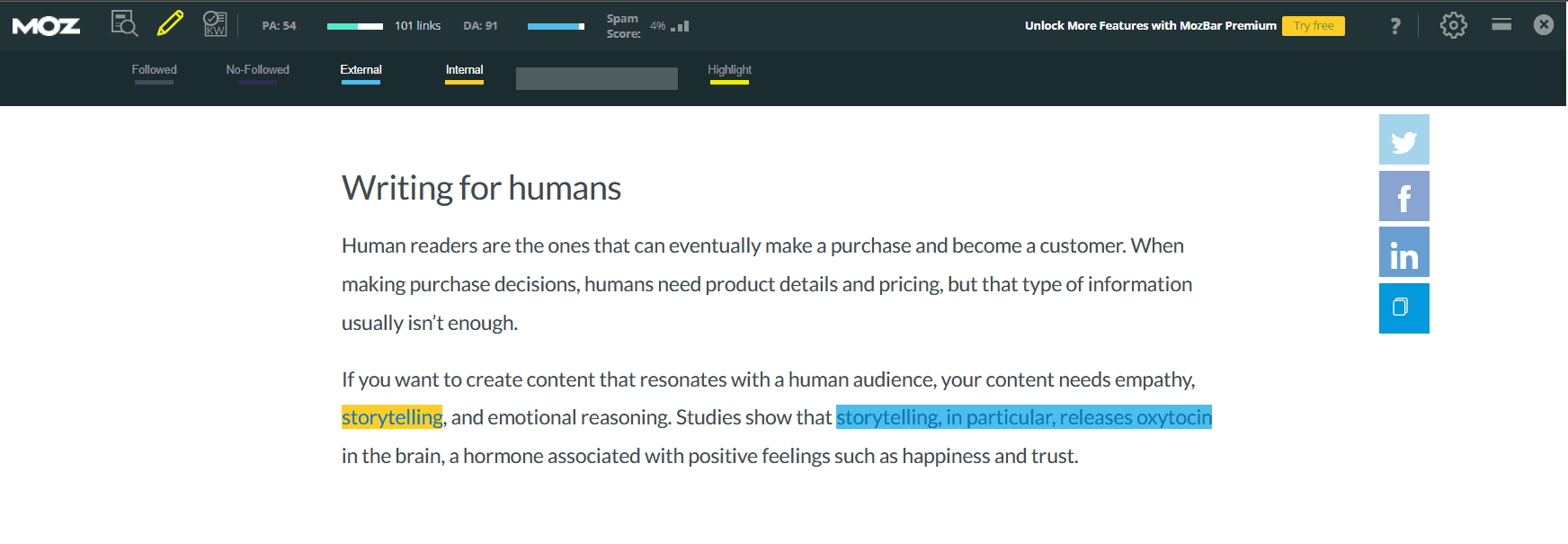
Screenshot
Best as: A tool to supplement Semrush or Ahrefs.
Pricing: Starts at $79/month when billed annually.
4. SparkToro
A successful content strategy requires you to balance the needs of both humans and bots. And although Semrush, Ahrefs, and Moz tell you much about how search bots treat your competitors, you’ll also need tools to understand their audiences.
And that’s where SparkToro shines. You just need to enter the competitor’s domain, and SparkToro will reveal the brand’s audience, their interests and behaviors, and the platforms they engage with.
You can use it to discover new and untapped audiences you haven’t engaged with before. For example, suppose you own an accounting and payroll SaaS company and consider Patriot Software your direct competitor.
You can enter Patriot Software’s website in SparkToro and get a read on where its audience hangs out. For instance, SparkToro found that Patriot Software’s audience visits Small Business Trends, a news website focused on small business news.

And that’s a great opportunity. All you have to do is create a viral post on Small Business Trends that shows you in a good light to woo away some of Patriot Software’s visitors.
Best as: An audience analytics platform.
Pricing: Starts at $38/month when billed annually.
5. BuzzSumo
If you’re trying to crack the making of viral content, look at how the social media audience engages with the individual pieces of content. And that’s exactly what BuzzSumo offers.
With BuzzSumo, you can analyze the competitors’ content to see how it fares among audience members. For instance, you can see how many backlinks it receives and how many shares it gets on social media.
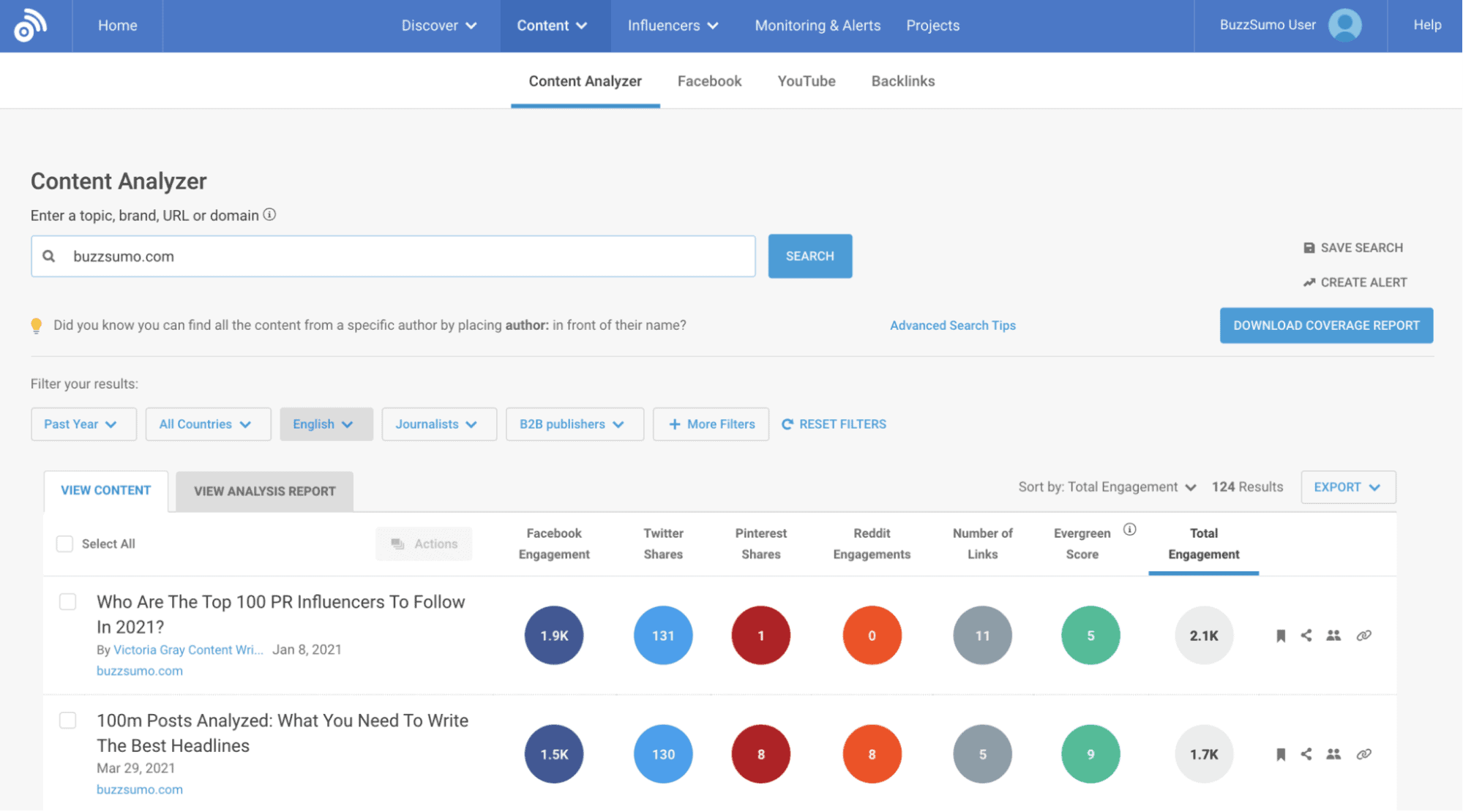
You can also filter it by time, authors, networks, and more.
Pro tip: If you’re looking for successful guest posters to drive social media engagement to your website, you can rely on BuzzSumo’s Influencer Marketing to find the most engaging influencers in your niche. And guess what? The Blogsmith’s Maddy Osman is in BuzzSumo’s top 100 content marketers.
And that’s barely the start. You can also compare your brand with competitors to see where you’re doing better or worse than them or use the tool to learn from the competition.
For instance, maybe you make more engaging why-focused posts than your competitors but lag in creating shareable infographics like Target.
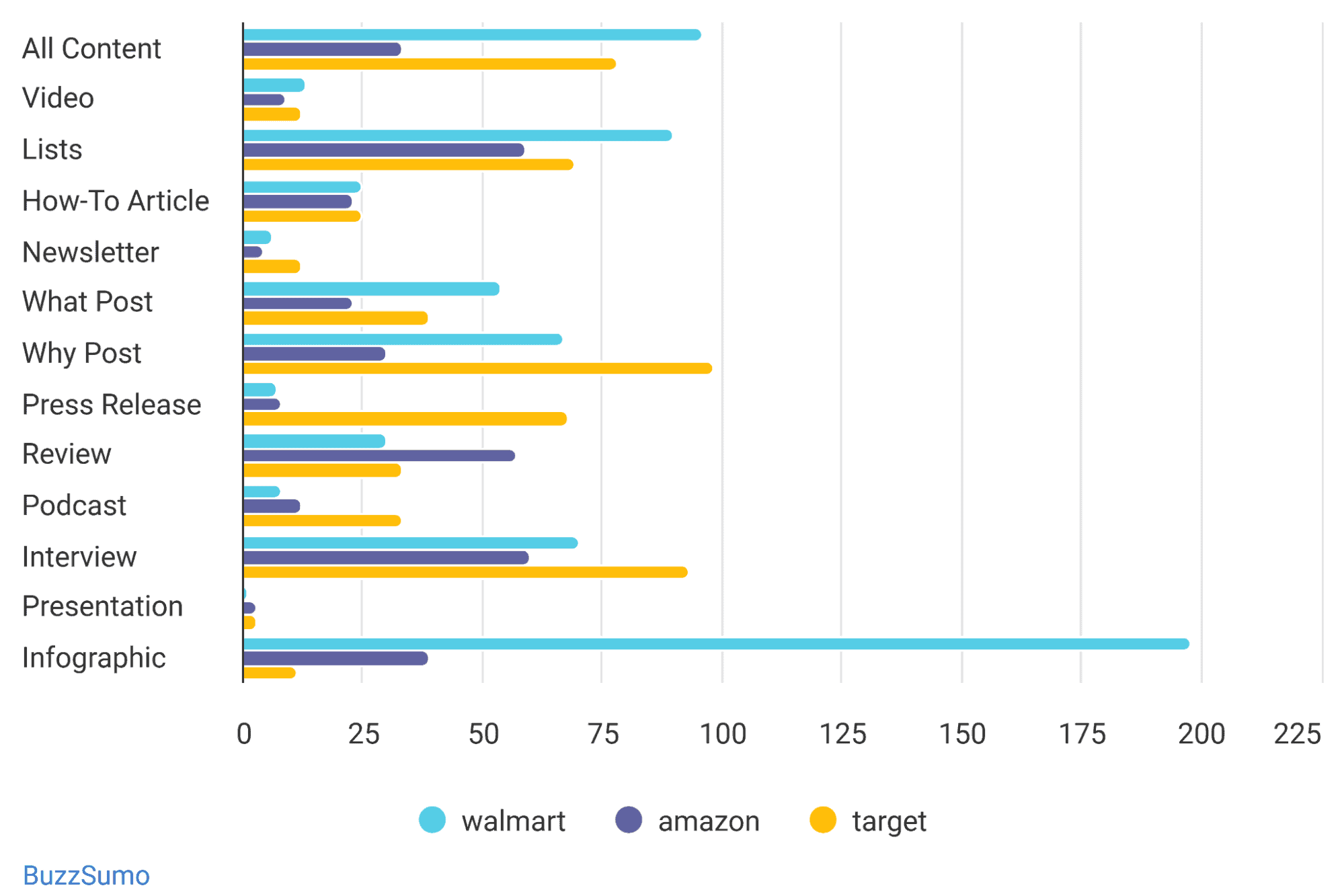
In other words, you can take inspiration from the competitor and replicate their success by shifting your focus towards in-demand content.
Best as: A competitor analysis tool for comparing social media engagement.
Pricing: $95/month when billed annually.
6. SpyFu
While SpyFu is often considered a cheaper alternative to Semrush and Ahrefs, it also offers several unique competitor analytics tools to help you with PPC marketing.
For instance, besides basic keyword research, SpyFu offers detailed historical data surrounding competitors’ advertising campaigns. You can get the competition’s most successful ad copy variations and respective estimated PPC budgets.
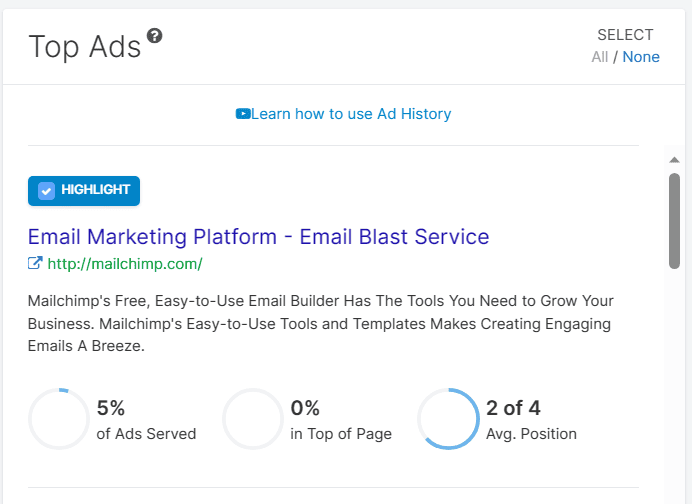
Additionally, if you’re looking to spy on the competitor’s recent PPC strategy, you can sort the list by new keywords and see where the competitor is looking to expand their digital marketing strategy.
Best as: A cheaper alternative to Ahrefs, Semrush, and Moz Pro for basic keyword research and PPC-focused competitive research.
Pricing: Starts at $16/month when billed annually.
7. SE Ranking
Like SpyFu, SE Ranking is another affordable alternative to Semrush and Ahrefs. And it also has a few unique tricks up its sleeve.
For instance, as its name goes, SE Ranking helps you track your progress against SERPs competitors in real time. You get actionable insights regarding ongoing SEO performance that help you respond to ranking changes.
For instance, here’s the SERP Competitors’ data for Tesla Motors for the keyword “electric cars,” accessed on July 21, 2023:
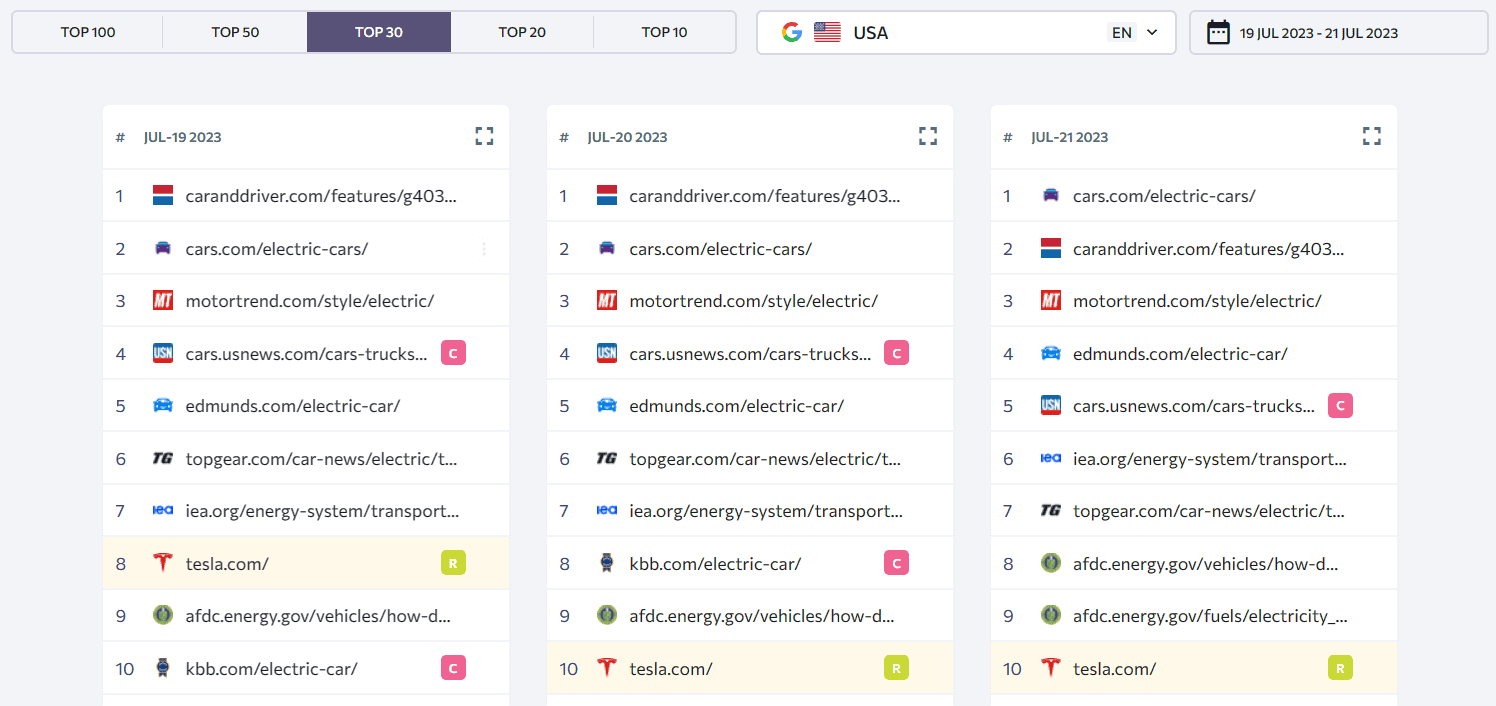
Screenshot
You can see that Tesla’s search rankings dropped by two positions on July 20, and Kelley Blue Book, a SERP competitor, marched ahead. If you’re a member of Tesla’s marketing team, this is an insight worth looking into since further drops would throw the brand out of the top 10 SERPs.
While SERPs analysis is the crown jewel of SE Ranking, it’s not all what SE Ranking offers. You can also have an overview of the competitor’s keywords, organic traffic, PPC data, and backlink profile.
In particular, you can use the Backlink Gap Analyzer to see which websites link to your competitors but haven’t mentioned your services.
Similarly, you’ll also love its Website Audit tool. It’s one of the few technical SEO auditing tools that makes information easier to understand and offers helpful insights to improve your website. For example, check out a comparison I ran between a friend’s website and its competitor:
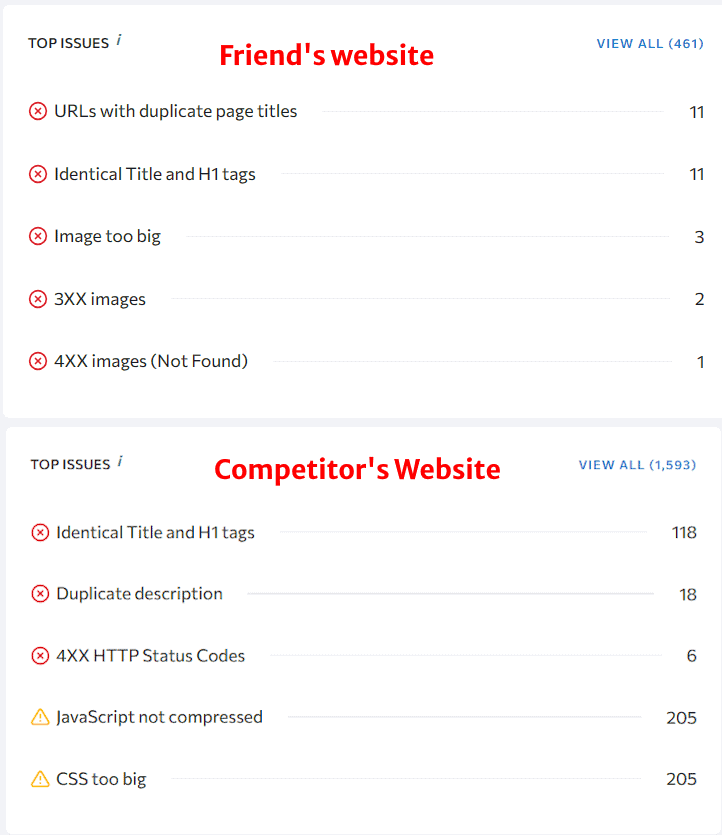
From the comparison, it appears that the competitor’s website is lagging behind in technical SEO due to poorly optimized meta tags. If your website suffers from similar issues, consider coming up with an H1 that’s slightly different from the title to incorporate more keywords.
Best as: A competitor analysis tool to track SERPs in real time.
Pricing: Starts at $44/month when billed annually.
8. SEO PowerSuite
SEO PowerSuite is another all-in-one solution for those looking to improve their SEO, with one distinction – it’s a desktop toolkit that you need to download and install on your computer. It includes four apps – Rank Tracker, Website Auditor, SEO SpyGlass, and LinkAssistant – each can help with competitor analysis.
Let’s take a look at the most prominent features:
To quickly identify your SEO rivals, go to the Competitor Research module in Rank Tracker. You may choose between two methods:
- Domain competitors: enter your domain URL, and the tool will find websites that have the highest keyword intersection with your site.
- Topic Competitors: specify your seed keywords and let the tool collect the top-ranking results.
No matter which method you pick, the tool will list your top SEO competitors with their keywords and organic traffic stats when the analysis is complete.

To see the best-performing content of any competitor’s domain based on its traffic and keyword data, switch to the Top Pages section.

You can later add those competitors to the rank-checking module to monitor their ranking progress as time passes.
The competitor analysis wouldn’t be complete without checking out the on-page optimization of those occupying the highest spots in Google. Using the Content Editor module in WebSite Auditor, you can see which keywords your current copy is missing based on the content of the top-ranking pages.
Finally, to study your competitors’ backlink profiles, use SEO SpyGlass. It allows you to see the backlink history of any domain and discover low-hanging fruit opportunities for your website.
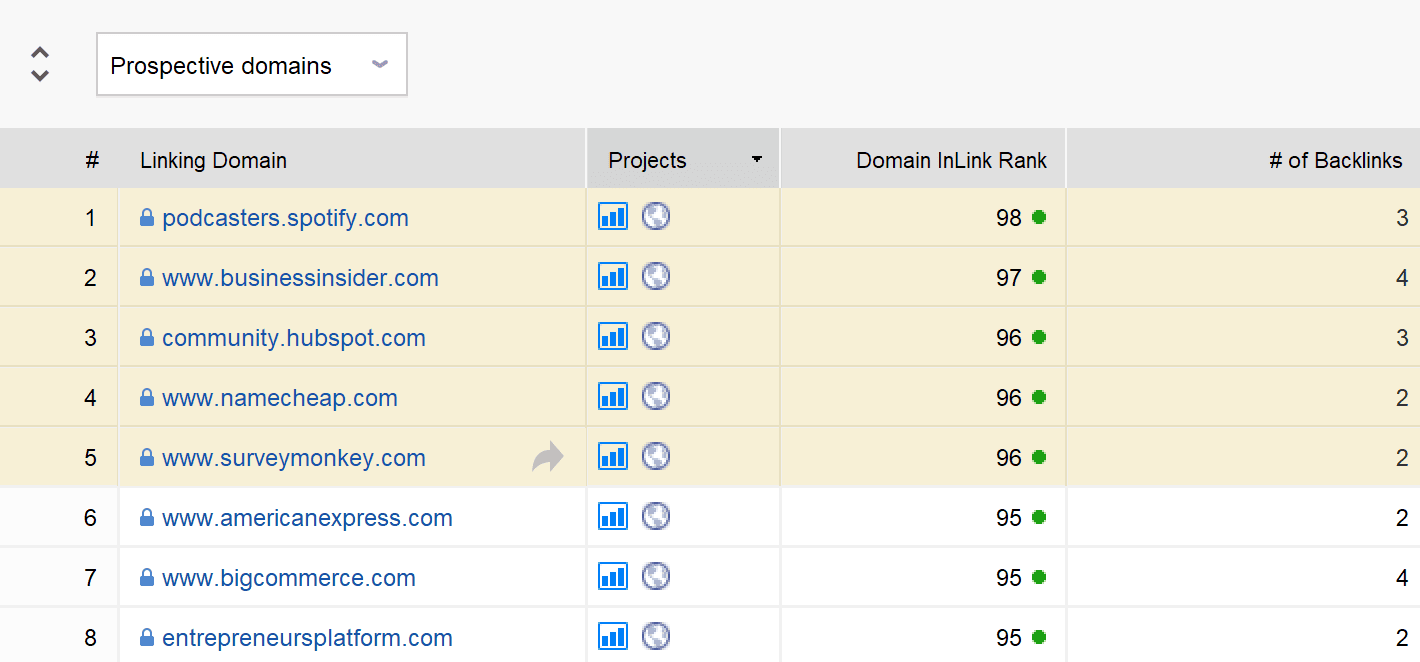
Best as: a budget all-in-one toolkit focusing on keyword research and rank monitoring.
Price: Free version available with limitations. The premium version starts at $299/year.
9. SimilarWeb
SimilarWeb takes a different approach and prioritizes a bird’s-eye view of the competitive landscape.
Besides the granular details, such as keyword research and PPC data, you have access to unique competitive intelligence datasets like:
- Audience insights: Get a read on the competitors’ audiences by getting valuable information on demographics, engagement metrics, and interests.
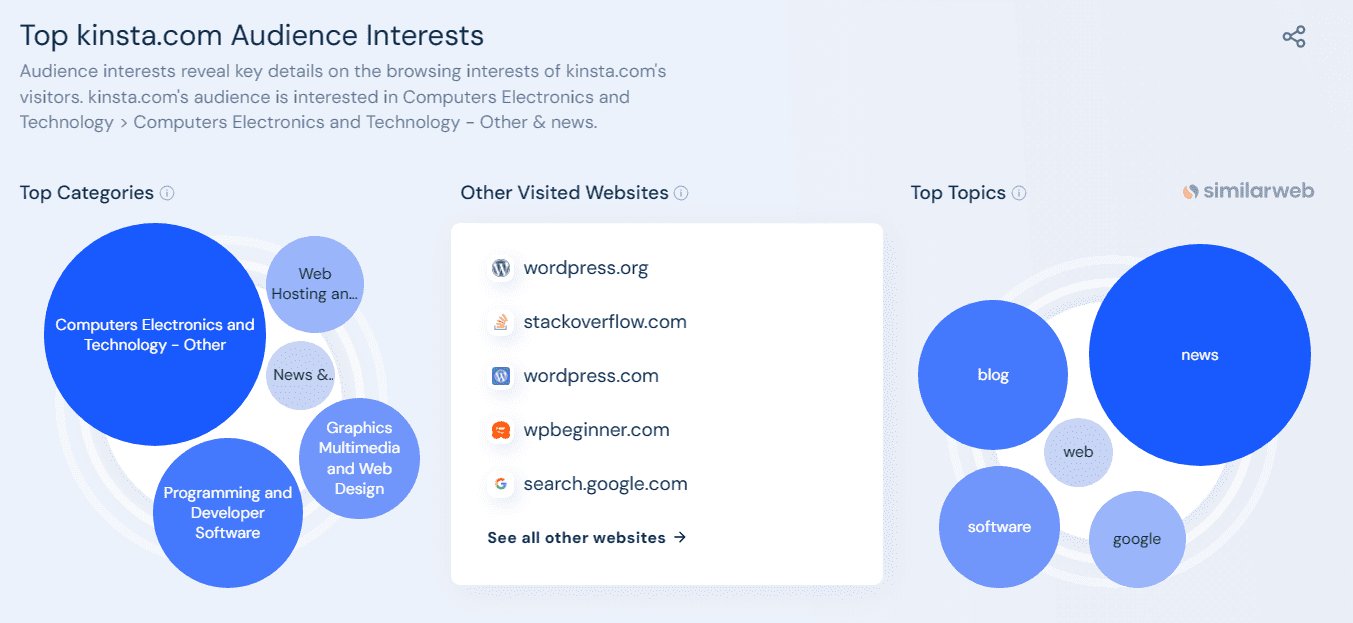
- Affiliate performance: Check out who sends the most website traffic to your competitors to see if you’re missing any potential influencer marketing opportunities.
- Marketing breakdown: Benchmark your marketing performance across the different channels against your competitors to see where you shine and where you require improvement.
And if you’re looking for even more top-down insights, SimilarWeb offers tools tailored for market research. You can monitor the macro trends in your industry, track top traffic channels, and access historical traffic and engagement data for the whole market.
Best as: A competitor analysis tool for macro competitive insights.
Pricing: Starts from $125/user/month when billed annually.
10. Serpstat
Serpstat is — let me say it — another cheaper alternative to Semrush and Ahrefs. While it doesn’t offer many unique features, there’s one feature I really like: Tree view.
Pro tip: If you’re struggling to scale up your content marketing efforts due to inconsistent results, check out this Serpstat webinar where The Blogsmith’s Founder, Maddy Osman, shares her insights on coming up with baseline style rules to balance the needs of humans and bots.
Tree view lets you see your competitors’ top-ranking pages and all the primary and semantic keywords they rely on to rank in the relevant SERPs.
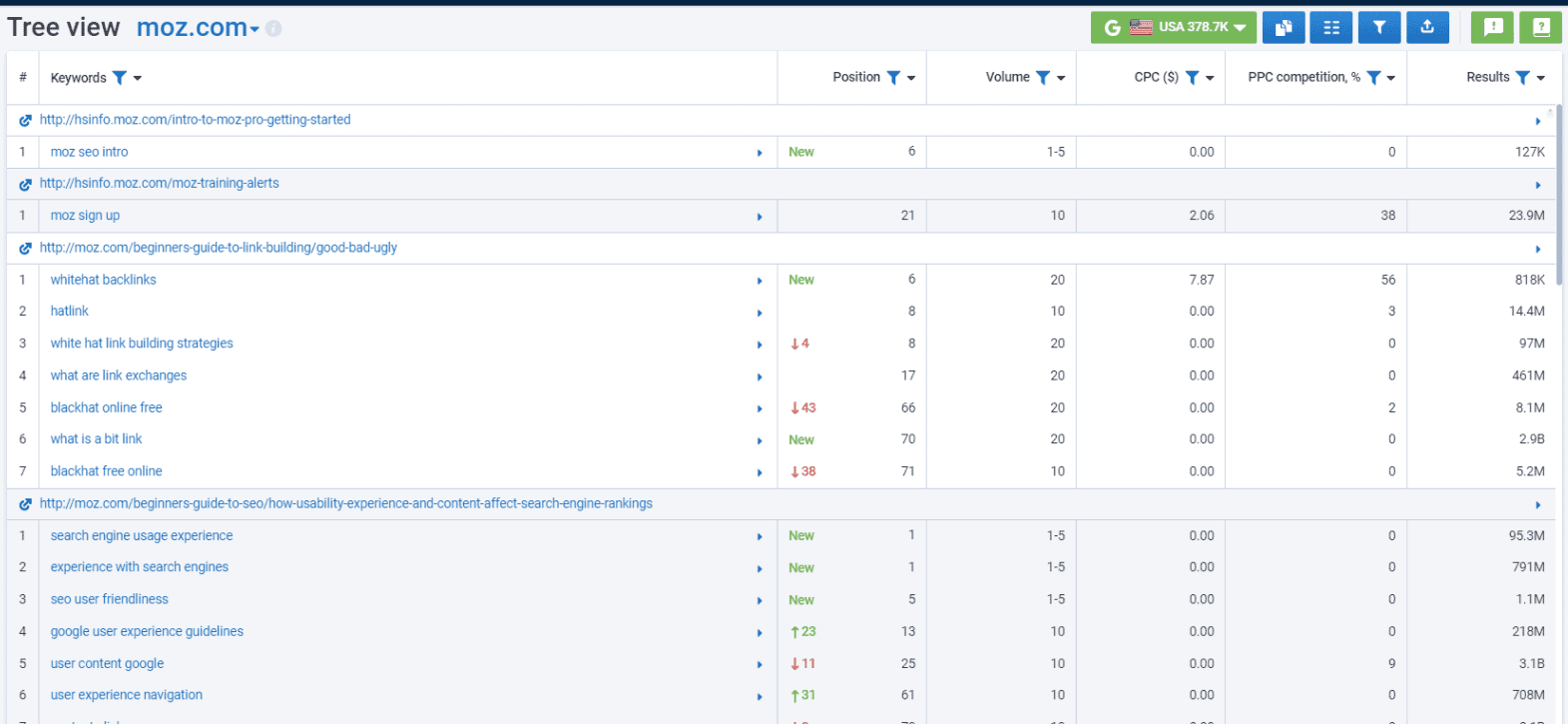
So, it gives you a great way to spy on the competitors’ content strategy and their best-performing keywords.
Best as: A budget alternative to Ahrefs and Semrush.
Pricing: Starts at $50/month when billed annually.
11. Majestic
While most other tools in the list promote themselves as all-in-one SEO tools, Majestic has a love affair only for backlinks. And it does what it claims remarkably well.
To start, Majestic offers metrics such as Trust Flow (quality of backlinks) and Citation Flow (number of backlinks) to help analyze the competitors’ backlinks. While Citation Flow has its parallels (e.g., Domain Authority in Moz and Domain Rating in Ahrefs), Trust Flow is unique to Majestic.
With Majestic, you don’t need to manually look up quality backlinks from the list of backlinks. Instead, you can just check out your competitors’ Trust Flow metrics to see how you’re doing in the backlink race — higher Trust Flow tends to attract more quality backlinks than others.

And that’s not all that Majestic offers. Majestic also has a unique offering called Topical Trust Flow, which measures how many backlinks you receive from websites of different niches.
Given that backlinks are one of the strongest ranking factors at the heart of search engine algorithms, which are akin to black boxes, there’s a strong chance that more backlinks from similar niches may contribute to how search engines interpret your website.
In short, Topical Trust Flow might help you position yourself as an authority in the eyes of search engines. Besides that, you also get all the other backlink-related tools that Ahrefs and Semrush offer, such as anchor text analysis, link context, and more.
Best as: A in-depth competitive analysis tool for backlink-focused insights.
Pricing: Starts at $41.67/month when billed annually.
12. Screaming Frog
Screaming Frog specializes in all things website analysis and technical SEO. You can use it to get a technical snapshot of a website.
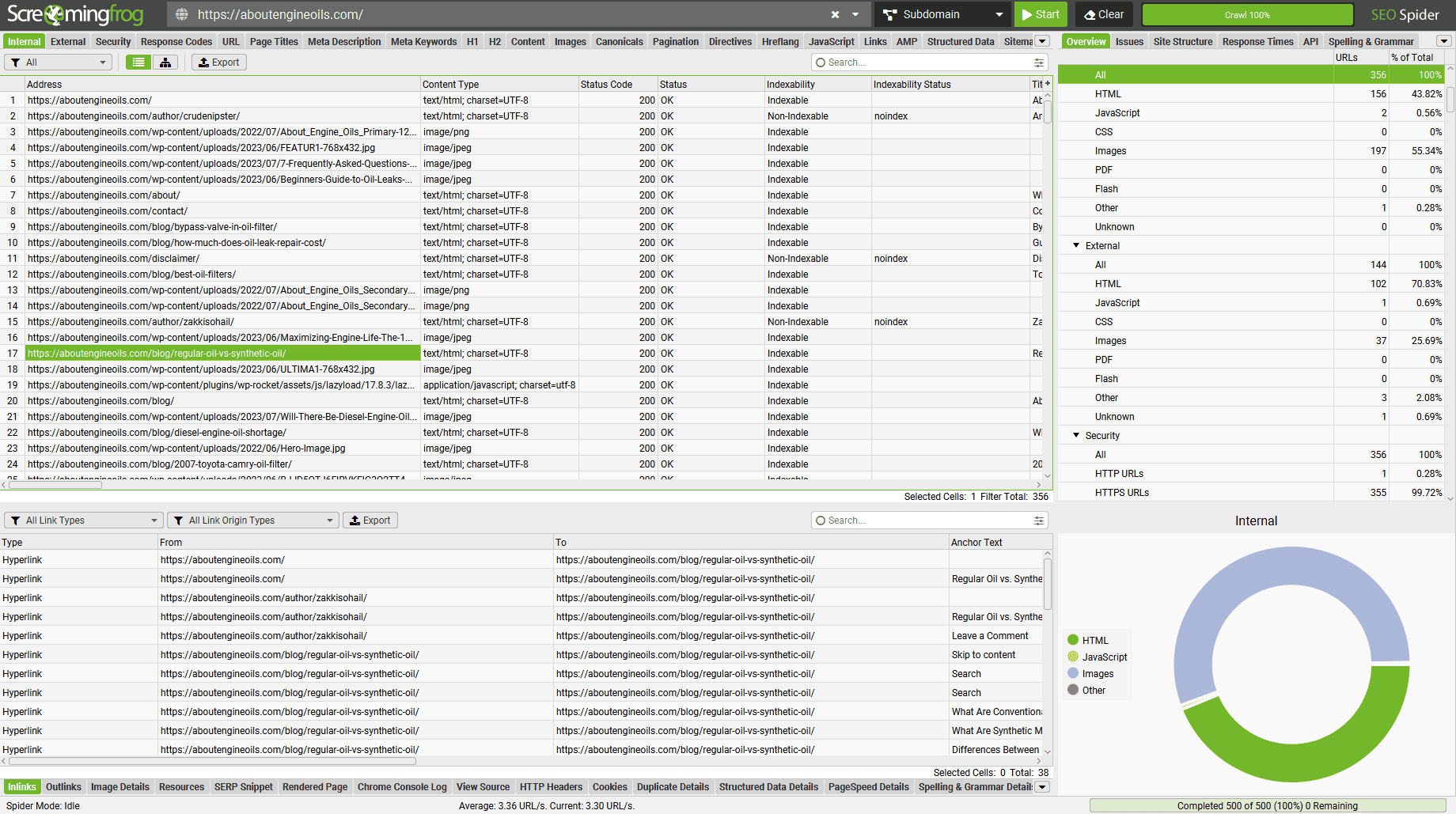
For example, you can quickly see how your successful competitors are optimizing their page titles and meta descriptions for different keywords.

Besides that, if you’re wondering how to structure your website successfully, you can also look to your competitors’ site structures for inspiration. See if they’re creating specific cluster content you need to prioritize and unearth other similar opportunities.
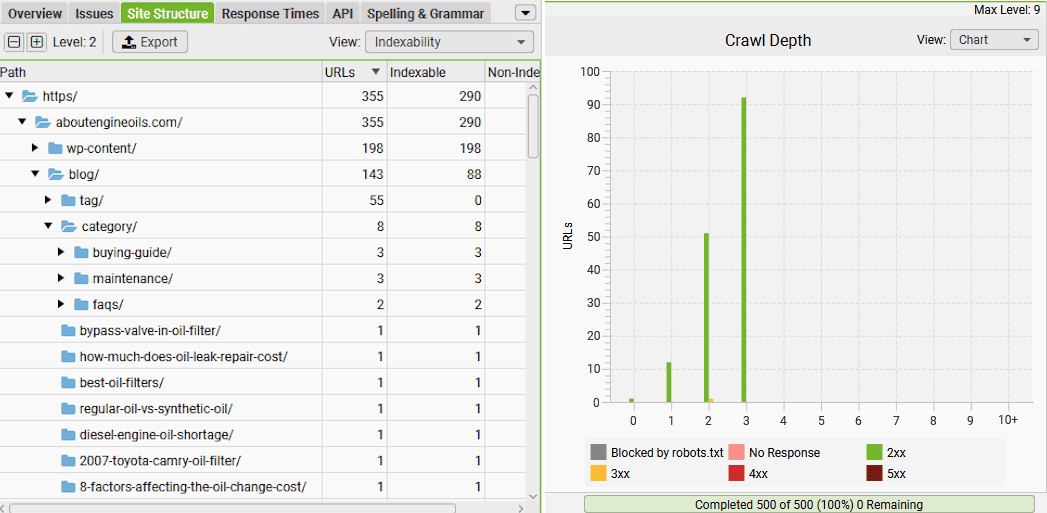
While the UI of Screaming Frog can be a bit overwhelming, it gives you a lot of insights you won’t find anywhere else. For instance, do you want insights into a competitor’s internal linking strategy?
You can get those by selecting a few URLs and heading to the Inlinks tab:

You can see where the internal links are placed and with what anchor text. From the screenshot, the competitor appears to use anchor text that describes the linked article instead of generic anchor text, such as “learn more” or “click here,” in its internal link-building strategy.
And that still doesn’t conclude what Screaming Frog has to offer. If you’re looking to draw inspiration from the insights a competitor’s content marketing team has gotten after months or years of content creation, you can head to the Content tab and see if there’s a pattern you can replicate.

You can categorize their blogs by short-form and long-form content and export the list to see how the shared target audience responds to different types of content. Result? You get content insights from your competitor’s efforts.
Best as: A supplementary tool to Ahrefs and Semrush to analyze your competitors’ websites.
Pricing: Free version available with limitations. The premium version is priced at $259/year.
Final Thoughts: 12 Best SEO Competitor Analysis Tools in 2024
That sums up almost all the SEO competitor analysis tools you need to look into, as of writing. If you’re looking to compete over keywords, Semrush and Ahrefs seem like stellar choices.
If you want to go beyond that, SparkToro can help you know where to set the spark, and BuzzSumo can tell you what’s buzzing and spiraling out of control on social media.
That said, understanding and using these tools carries a cost in both money and time. So, if you want to focus on the business side of things without sacrificing brand building, consider working with The Blogsmith instead.
Check out our SEO content writing services, and let us turn your competitors’ efforts into actionable insights that power your content strategy and position your brand as the better option.












